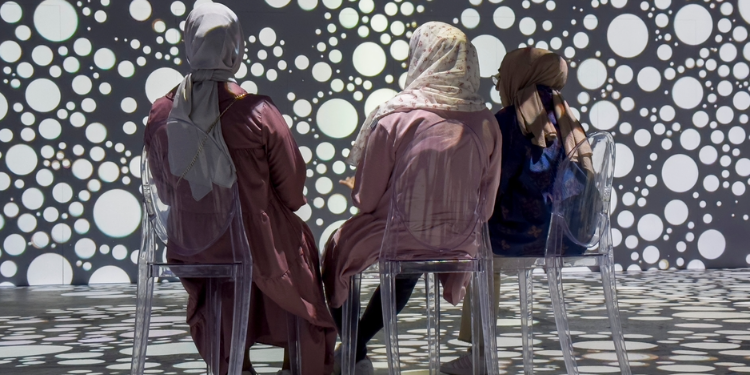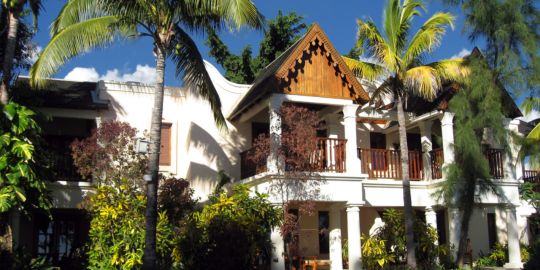Where are you from, Dee, and what are you doing nowadays?
I moved here in August 2011 with my husband for his new job. I originate from Cheshire and my husband is from Newcastle. We lived in Hampshire for over 20 years because of the fast rail line into London for my husband. Our children are all grown up. We have 2 sons aged 39 and 32 respectively and one daughter aged 28. Two of our children live and work in Dubai/Abu Dhabi and one still lives in England. I fill my days here with voluntary work, although I still make time for my friends.
Why did you choose to move to Mauritius? What has attracted you there?
My husband was approached to come and re-brand a local company for a year. We decided to accept the offer, even if it was just for a year. As our children had finished University, we no longer had to finance them and we felt we could not miss out on this experience, even if we had to return to England after a year. However, the company asked him to stay, and here we are 4 years later. My husband's work permit has recently been renewed for another 2 years.

What were the procedures to follow for a British national to move there?
Not fully sure on this as my husband was offered a job through a local Mauritian company and they dealt with everything. I know there were dealings with the Board of Investment(BOI) where we had to send his qualifications, etc. As soon as he had that, he then applied for a dependent permit for me. I am not allowed to work according to my permit. If you Google "BOI Mauritius" or "Board of Investment Mauritius" it shows the main site and this will give you all the information that you require.
Was it difficult to find accommodation there? What are the types of accommodation which are available?
Not at all difficult. What is harder to find is unfurnished property as most are fully or partly furnished houses. We also had two dogs with us, so we needed to find a house with good size garden and the other stipulation was a decent-sized pool as my husband loves to swim. The first year, we rented up towards the Mountains. For the last three years, we have rented very near to the beach, although I have to say we rarely go there on our own. We tend to meet friends for a beach BBQ, but we use our pool a lot. We have also been lucky to have had two very good landlords who dealt with things quickly.
I could not understand why some front rooms/sitting rooms were smaller than what I was used to in the UK, but this is because you are rarely in them! In the UK, you entertain in your front room, here you entertain on your terrace. Your life is in your outside space: you eat outside under your terrace. Some friends even have their TV outside. So remember, in my opinion, the house size means little, but the outside space is important.
I also find it unusual that you have to pay the estate agent one month's rent if you find a house through them, plus the landlord also has to. Some smaller agents are now just asking half a month's rent which is much better, but lots of people use the notice boards in shops, the local newspapers, as well as local pages on social networks to rent directly with the landlord. This helps in cutting out the finder's fee. You usually have to pay two months' rent upfront as a deposit.
How do you find the Mauritian lifestyle? How about the expats living there?
The Mauritian lifestyle is much simpler than the UK. To me, Mauritians are not as materialistic. You have to learn to go slower here. Life is not so rushed. Remember this and adapt. I have never yet met an unfriendly local Mauritian - a Smile goes a long way.
Oddly most of our friends are expats, it seems we are all drawn to each other maybe? Or that we go to similar places, or we do not speak the local language although most people speak English.

Have you been able to adapt yourself to the country and to its society?
Yes totally now, but the first few months were extremely hard. I was alone, knowing no one. My husband was busy at work with his new job and I remained home alone. Our children are all grown up, so I could not meet mums at the schools. I recall telling my husband we had to go "home" as I was so lonely. I used to spend a few hours a day in the local supermarket just to be able to talk to someone. Then one day, I was invited out for coffee, and also given names of local groups online. After that, there was no looking back.
There are many religions here and they all respect each other. We even get public holidays for each religious festivals. You have to remember we are guests here in their country and it is us who have to adapt to the ways here.
What has surprised you the most at your arrival?
Positive: The people are so friendly and smiling and they always smile back with a friendly wave. There is no rushing about, everyone is chilled.
Negative: The driving but I have learnt to chill and just let people overtake and be aware at all times of dogs, goats, people wandering out onto the road, or someone just stopping their car wherever to take a call, etc.
I find it so sad to see street dogs. I also have to say that I have never met an unfriendly one. They tend to keep clear of you. I carry food in my car and regularly feed local dogs in our area. Myself and some others regularly catch and sterilize local dogs, organize fund-raising activities, etc.
What does your everyday life look like in Mauritius?
During the week, I do around three days of volunteer work, either with local children or with the street dogs. I keep the other two days for myself to either have lunch/coffee with friends or to have a quiet day at home catching up with paperwork or just pottering about. The week-ends can be as busy or as quiet as you want them to be.
Here in Mauritius most of us have maids, gardeners and a pool man. The salaries are much much lower than say the UK. Often the pool man and gardener are included in your rental. So obviously, you have more time to do the things you want to do.

Any particular experience you would like to share with us?
Just an example of how friendly and helpful the local people are. I often get lost driving around same in the UK. One particular day, I ended up in a remote area in a dead end. There was a group of local men sat on the edge of the road. I asked them for a place I knew I could get back home from. They didn't' speak English but recognized the area I was asking. They tried to explain. In the end, they directed me to turn around in a very small area and then one guy walked in front of the car to the road end and through hand signals directed me which way to go. All of them had a smile on their face and not once did I feel threatened. Another one is being in the local supermarket and local children with whom you volunteer running to you and giving you a big hug. This is totally priceless!
Your favorite local dishes?
Dholl puri: Pancake style of flat-bread rolled up with blended yellow split peas or a tomato based filling, often bought from street vendors and eaten as you walk around. It is so yummy. You can also hire a local person to come to your home and cook them for a party very cheaply.
Noodles: Bought fresh and stir-fried with chicken and vegetables
Briani: Similar to Indian biryani. It's a rice dish made with either beef, chicken, fish, mutton or vegetables (as well as yoghurt, saffron and spices) that originates from Muslim Mauritians.
I also love those typical Mauritian curries that do not burn your mouth off when hot. The Mauritian massala is totally different than the Indian massala.
I also love to serve my curries with farathas which is a flat-bread that may be stuffed or not. It is usually on the thicker side and may have several layers (8-10) that are well-oiled with ghee.
I also eat more fresh fish here. For the time being, tuna carpaccio is my favorite.
What is your opinion on the cost of living in Mauritius? Is it easy for an expat to live there?
Yes, obviously. Lots of things are more expensive than what we are used to, but you have to remember that this is an island and lots of things have to be imported. If you buy seasonal fruits and vegetables, then it is much cheaper than buying imported out of season.
I think it is easy for an expat to live here, but they have to remember they are the ones who need to adapt as things are not the same here as they would be in their own country. If I hear someone complaining about something being better in their country or they do it differently, then I am so tempted to tell them to go back to their country.
How do you spend your leisure time? What are the activities that are accessible to expatriates there?

We have found our social life here is much busier than we used to have in the UK although we thought we had a busy one. You can meet friends at a local restaurant or more often hold get-togethers at people's houses for a meal or BBQ, or even on the beach. Sundays are often spent chilling at home around your pool or with friends or meeting at the beach for a BBQ.
There are also the common activities here such as gyms, as well as lots of water sports. You also have many groups such as reading/swimming/art/pottery/cooking clubs. If you want to do something specific and there is no group, you can then easily start your own by posting on one of the local online groups for your area.
We also love doing local catamaran trips with friends, seeing the dolphins and then a relaxing day on the cat. Many places, including hotels, have reduced rates for permit holders and Mauritian residents.
What are the differences between life in Mauritius and in England?
The quality of life. Life is much more relaxed here. Your social life is usually always outside due to the good weather. You also tend to socialize more here and have much less materialistic tendencies. It does not matter what car you drive, how big your house is, etc.
What do you miss the most about your home country?
Old friends, although we have made some lovely friends here, and shopping although you can usually find what you want. But you have to remember this is an island and almost everything has to be imported. I just miss the sheer choice I get in the UK.
Would you like to give any advice to soon-to-be expatriates?
Allow yourself up to 6 months to fully settle down and make new friends. Go with the flow and relax.
What are your plans for the future?
We have no plans as such. We shall remain here till my husband has his job. When we leave, we will return to the UK as we have our house there and recall what a fabulous experience we have had in Mauritius.

















Contact us to be featured in the Interviews section.
Participate